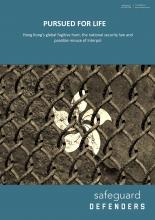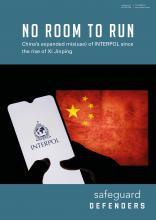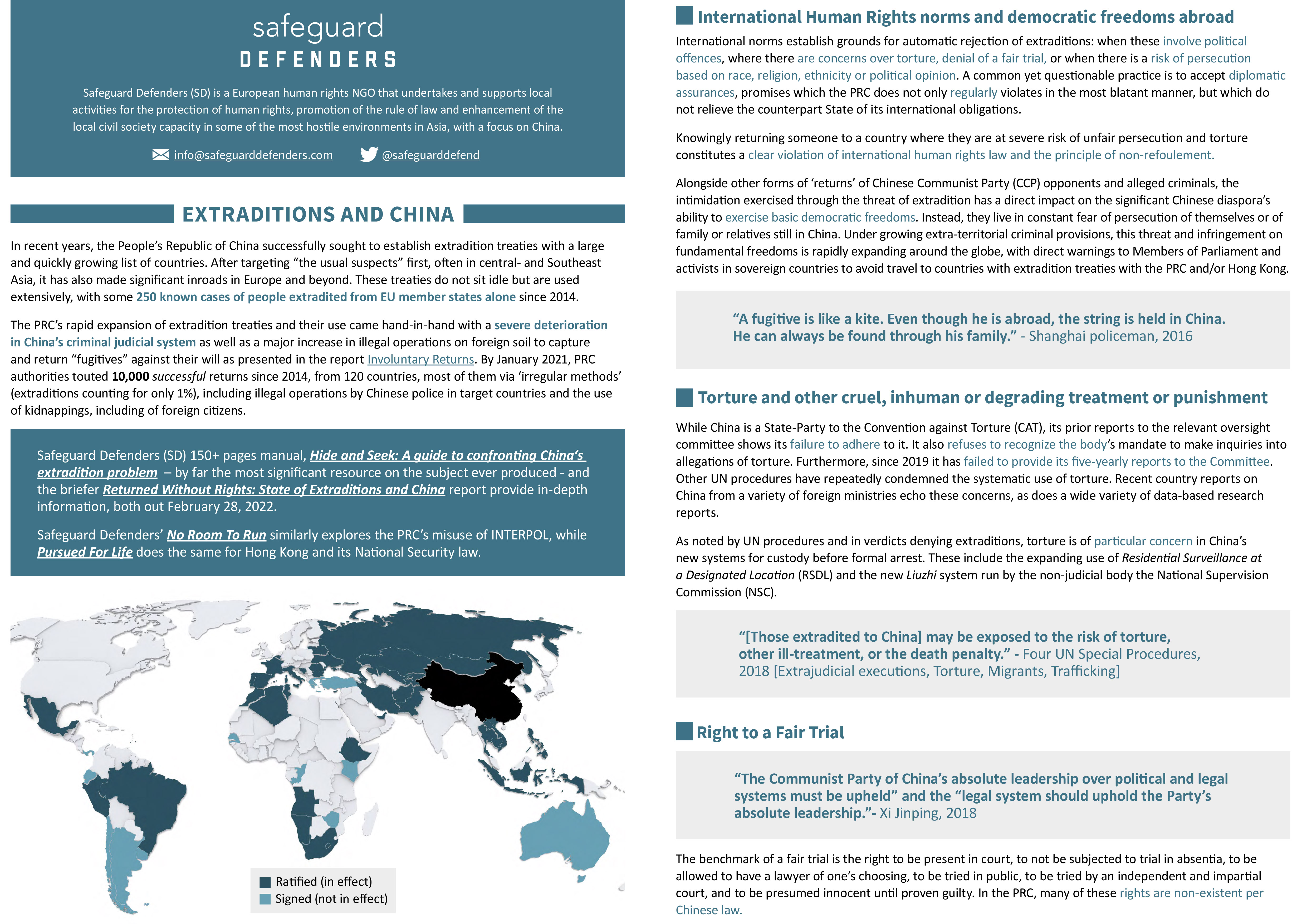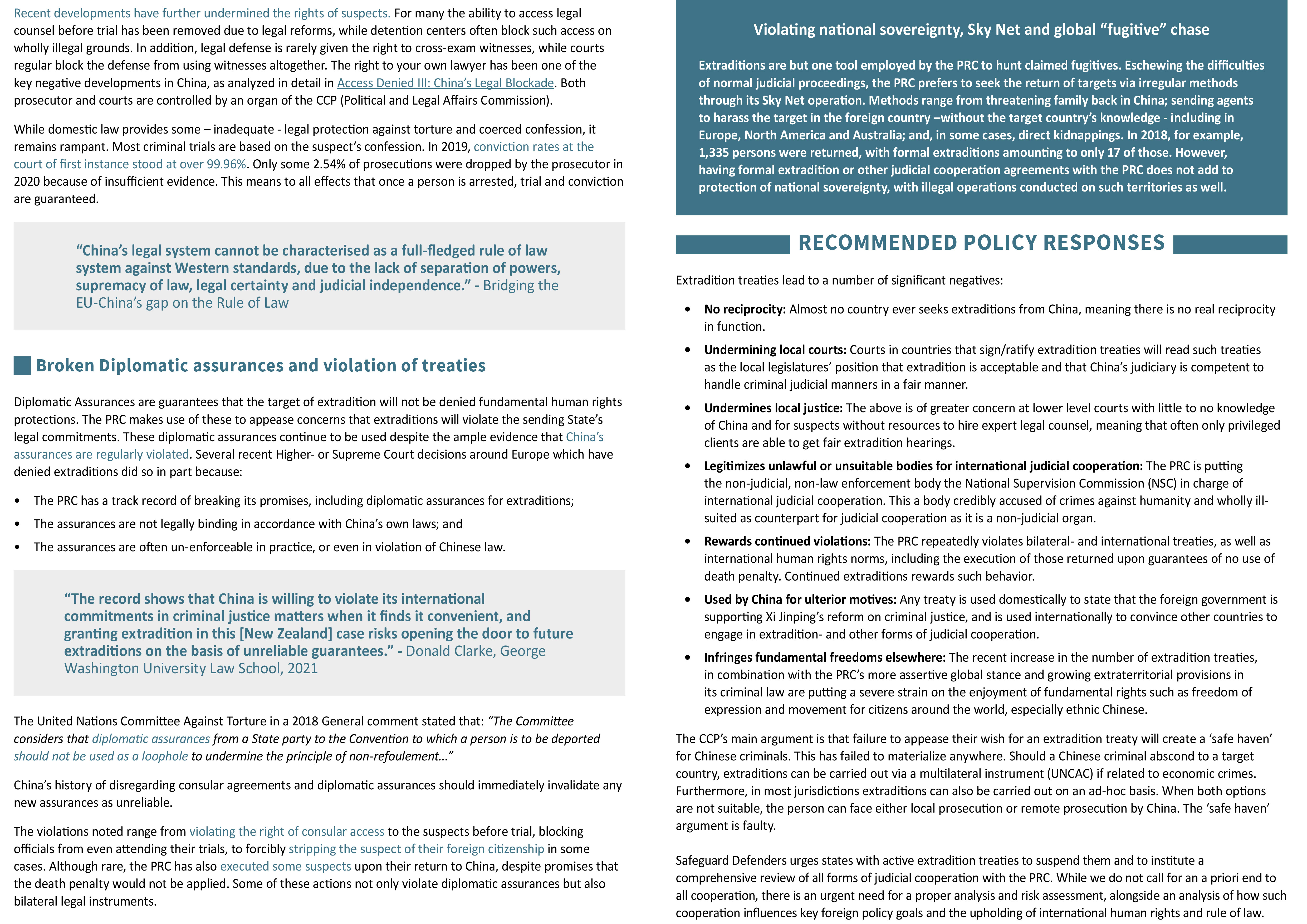Czech Republic discusses suspending Extradition treaty with HK, as National Security Law is used against foreign critics overseas
Tonight (5 September 2022), starting at 18:00 the Czech Parliament will be hosting a hearing on its extradition treaty with Hong Kong, chaired by key Foreign Affairs committee members from both the Chamber of Deputies and the Senate. Foreign Minister Jan Lipavsky is also expected to attend.
Full program here:

Safeguard Defenders Laura Harth, along with exiled Hong Kong pro-democracy activists and Sinopsis will be presenting information the extradition treaty, the consequences for rule of law and human rights protections in the Czech Republic, and the greater EU, and what maintaining the treaty means for the Czech Republic in the world.
The hearing’s program, called “The Extradition Treaty with Hong Kong - In light of the State Security Law”, states that
Between 2013 – 2014, the Czech Republic concluded three agreements with Hong Kong, including: an agreement on the transfer of convicted persons; an agreement on the transfer of persons wanted for criminal proceedings; and an agreement on mutual assistance in criminal matters.
With the imposition of the State Security Law on Hong Kong in July 2020 and subsequent acts such as the new election law, a legal situation similar to that of the People's Republic of China (PRC) has arisen in Hong Kong.
The Czech Senate has already called for the suspension of the extradition treaty with Hong Kong, echoing the repeated calls by the European Parliament to suspend all extradition treaties with Hong Kong and Mainland China. Following the imposition of the National Security Law in Hong Kong, on 24 July 2020 the European Council – currently presided by the Czech Republic – decided as an initial response “to endorse a coordinated package responding to the imposition of the national security law, to be carried out at EU and/or Member State level, as deemed appropriate, within their respective areas of competence”, including: “Reviewing the implications of the national security legislation on the operation of Member States’ extradition and other relevant agreements with Hong Kong.”
Since the imposition of the National Security Law, ten democratic nations suspended (or halted the ratification process of) their extradition treaties with Hong Kong. Within the European Union, only the Czech Republic and Portugal still maintain active bilateral extradition treaties with Hong Kong.
In its 24th Annual Report to the European Parliament and the Council on political and economic developments in the Hong Kong Special Administrative Region of May 20, 2022, the European Commission reiterated how the measures taken by the EU and Member States in response to the NSL in the Council Conclusions adopted in July 2020 remain in force, including: “a review of the asylum, migration, visa and residency policy, and of extradition agreements”.
For a full overview of statements toward and decisions to suspend extradition treaties with Hong Kong, see the summary overview.
For background on Czech policy towards China, see Sinopsis excellent summary.
For a full overview of statements toward and decisions to suspend extradition treaties with Hong Kong
HK ups the ante: Uses national security law against foreign citizens abroad
 While the hearing was in preparation, Hong Kong’s national security police made the suspension yet more urgent, as it moved to charge a Canadian citizens and two U.S. residents under the national security law for “subversion”, in a move that echoes the PRC’s application of law against political dissenters. All three are being charged for forming a political organization in Canada and the U.S., and not for any activity carried out in Hong Kong. The full scope of extraterritorial application, and now also against foreign citizens, is now becoming clear.
While the hearing was in preparation, Hong Kong’s national security police made the suspension yet more urgent, as it moved to charge a Canadian citizens and two U.S. residents under the national security law for “subversion”, in a move that echoes the PRC’s application of law against political dissenters. All three are being charged for forming a political organization in Canada and the U.S., and not for any activity carried out in Hong Kong. The full scope of extraterritorial application, and now also against foreign citizens, is now becoming clear.
No one can say they weren't warned. A recent investigation from Safeguard Defenders took note that the then security chief, John Lee, and already then heir apparent to the top leadership, had been vocal about expanding the use of the law, and using "international instruments" to seek such "fugitives'" return to Hong Kong. Another investigation, into China’s expanding use of INTERPOL, has also been released by Safeguard Defenders.
 In fact, the then chief of security, and now Chief Executive, has repeatedly made clear that extradition treaties, as well as mutual legal assistance treaties (MLATs) and INTERPOL can be used to chase those wanted under the NSL. Not long after, the first known attempt to use an MLAT, with Denmark, was reported by Safeguard Defenders, as Hong Kong police was trying to collect evidence against two Danish members of Parliament.
In fact, the then chief of security, and now Chief Executive, has repeatedly made clear that extradition treaties, as well as mutual legal assistance treaties (MLATs) and INTERPOL can be used to chase those wanted under the NSL. Not long after, the first known attempt to use an MLAT, with Denmark, was reported by Safeguard Defenders, as Hong Kong police was trying to collect evidence against two Danish members of Parliament.
Conclusions from Safeguard Defenders' investigation into Hong Kong's global policing of critics have already come true, and it is likely its attempt to use extraditions, MLATs, and INTERPOL is about to come true as well, as these developments merely follow the words of the new leader John Lee. Failure to suspend the treaty, which has been called upon by the Council of Europe and followed by all other EU member states (except Portugal) is also allowing HK and the PRC to sow discord within the EU, and failure to suspend is to play into the hands of the PRC and undermine EU unity.
The Czech Republic and Portugal remains not only the only EU countries with extradition treaties with Hong Kong, but the only European ones, and in fact, the only developed democratic nations anywhere to maintain such still. As John Lee guides Hong Kong police to expand the application of the NSL, it’s high time for the Czech Republic to follow the call by its own Senate and suspend the treaty.
Safeguard Defenders policy recommendations and key issues
- No reciprocity: almost no country ever seeks extraditions from China and/or Hong Kong, meaning there is no real reciprocity in function.
- Undermining local courts: Courts in countries that sign/ratify extradition treaties will read such treaties as the local legislatures’ position that extradition is acceptable, and that China/Hong Kong’s judiciary is competent to handle criminal judicial manners in a fair manner. This is of greater concern at lower level courts with little to no knowledge of China and for suspects without resources to hire expert legal counsel, meaning that often only privileged clients are able to get fair extradition hearings.
- Legitimizes unlawful or unsuitable bodies for international judicial cooperation: The PRC is putting the non-judicial, non-law enforcement body the National Supervision Commission (NSC) in charge of international judicial cooperation. This a body credibly accused of crimes against humanity and wholly ill-suited as counterpart for judicial cooperation as it is a non-judicial organ.
- Rewards continued violations: The PRC repeatedly violates bilateral- and international treaties, as well as international human rights norms, including the execution of those returned upon guarantees of no use of death penalty. Continued extraditions rewards such behaviour.
- Used by China for ulterior motives: Any treaty is used domestically to state that the foreign government is supporting Xi Jinping’s reform on criminal justice, and is used internationally to convince other countries to engage in extradition- and other forms of judicial cooperation.
- Infringes fundamental freedoms elsewhere: The recent increase in the number of extradition treaties, in combination with the PRC’s more assertive global stance and growing extraterritorial provisions in its criminal law are putting a severe strain on the enjoyment of fundamental rights such as freedom of expression and movement for citizens around the world.
Safeguard Defenders factsheet on Extraditions and China (click for PDF).

